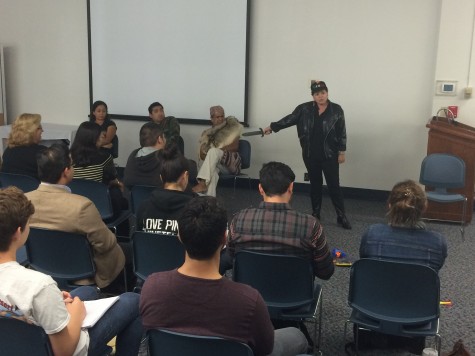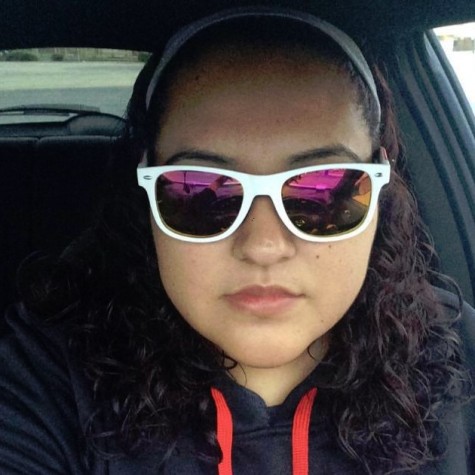
Teatro Izcalli is a Chicano theater group that was created to tell the untold stories and contributions of the Chicano community through playwright. It was founded by Macedonio Arteaga, a San Diego native. Growing up he noticed the lack of representation and exposure the Chicano community had in schools.
“It wasn’t until I was at UCSD that I had seen myself on stage for the first time.” He said as he addressed his audience here at Mesa College.
On Nov. 3, Teatro Izcalli paid a visit to Mesa College to celebrate their 20 year anniversary. Arteaga along with some of his actors performed a few of their skits for the audience. They wanted the audience to see what it’s like to be in a Chicano Theater group. All of their plays and skits are written and produced by them. They address issues such as racism, identity, higher education, political satire, as well as other issues that affect the Latino community.
Through the 20 years Teatro Izcalli has been established, they have traveled the country performing their plays and skits for different schools and organizations. Not only are they spreading an important message across the country, but they also give back to the San Diego community. They mentor young adults and even have summer programs available for kids.
In the presentation Arteaga engaged the audience by asking them a few questions. He asked them to name some great philosophers, classical literature they read in high school, as well as some of the playwrights their high schools produced. He then asked them the same questions, but to only name Latinos this time. The audience went quiet. They were unable to name one person per category. “This is why we started 20 years ago,” he said.
Hispanics and Latinos have contributed a great deal to society. Arteaga believes that many schools do not teach or even acknowledge those contributions. In a perfect world, the audience would have been able to name at least a few Hispanics for each of the questions asked above.
Teatro stands for theater in Spanish and Izcalli stands for a house of reawakening. It comes from the Náhuatl language; an ancient language that is still spoken in some parts of Mexico. It is more commonly known as the language spoken by the Aztecs.
Arteaga’s goal behind Teatro Izcalli was to spread awareness to the Latino community, specifically the youth. According to Teatro Izcalli’s website their mission was to “create a space for young Chicana/o students to learn about their history and culture in response to a public school system that does not encourage knowledge or pride in that history.”
One of the skits that they performed for the audience was Chicano Rehab. It was a self-reflective skit that showed us some of the stereotypes that accompany the Latino community. Specifically; how some things are taken too seriously. Different points of view were shown in the performance. The point of the skit was to show the audience that just because you’re Hispanic, doesn’t mean you have to act a certain way. It’s OK to not fit the stereotype society has made for you.
The second skit the Teatro performed had to do with the issues that are sometimes involved when a Latino/a gets accepted into a university. Hispanic families can be very family oriented; it can sometimes be hard when someone, like a daughter wants to leave the nest to pursue higher education, or leaving the nest in general. In the skit we saw the conflict a Latina faced when she told her father she had been accepted into a four-year university. Her father refused to let her leave because he believe that once she left the house she would be up to no good. This scenario is pretty common in the Latino community.
Both skits were great and they shined a lot light into some of the issues the Latino community faces.
Arteaga’s and the Teatro’s dreams are slowly coming true. Because of them Chicano children are seeing themselves on stage for the first time. They can relate to the skits. Their story is finally being told. But the fight is not over yet. According to Arteaga, “The San Diego Unified School District and the Sweetwater District… still have yet to produce a play written by a Mexican American… In the year 2015 I shouldn’t be saying this.”
The Teatro has published two different playbooks with plays written by them. They are also in the process of publishing a curriculum book for teacher to help them teach the untold stories and accomplishments the Latino community has had.
For more information on their show schedule and their programs you can visit Teatro Izcalli’s Facebook page or visit their website at http://izcalli.org/

